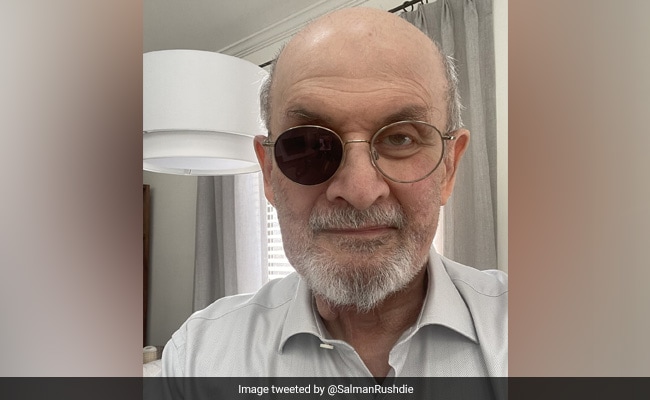
Salman Rushdie's memoir 'Knife' recounts his harrowing experience of being stabbed at a public event in 2022, resulting in loss of sight in one eye. Rushdie, based in New York, faced death threats since 'The Satanic Verses.' The knife attacker had no expertise, a reminder of the fatwa against him. The American assailant cited religious motives. Rushdie, a symbol of free speech, expressed gratitude for surviving the attack.

On August 12, 2022, novelist Salman Rushdie was stabbed multiple times as he was about to give a public lecture at the Chautauqua Institution in Chautauqua, New York, United States. A 24-year-old suspect, Hadi Matar, was arrested directly and charged the following day with assault and attempted murder. Rushdie was gravely wounded and hospitalized. Interviewer Henry Reese was also injured by the attacker.Rushdie, an Indian-born British-American, has been threatened with death since 1989, a year after the publication of his novel The Satanic Verses, when the Iranian Supreme Leader Ayatollah Ruhollah Khomeini issued a fatwa calling for his assassination and set a bounty of $3 million for his death. For years, Rushdie had lived in hiding, taking strict security measures that gradually became more relaxed over time.The government of Iran denied having foreknowledge of the stabbing, although state-controlled agencies of the Iranian media celebrated it. U.S. law enforcement is investigating whether the assailant was in contact with other extremists. Rushdie’s memoir about the attack, Knife: Meditations After an Attempted Murder, is scheduled for publication in April 2024.

Following Ayatollah Khomeini's 14 February 1989 death fatwa against author Salman Rushdie, after the publication of Rushdie's novel The Satanic Verses, British musician Yusuf Islam (previously and better known by his stage name Cat Stevens), made statements endorsing the killing of Rushdie, generating sharp criticism from commentators in the West.In response, Yusuf Islam said that some of his comments were "stupid and offensive jokes" made in "bad taste," while others were merely giving his interpretation of Islamic law but not advocating any action. Islam also said that later in the same programme he promised to accept the judgment of a British court if it found Rushdie innocent of any crime, blasphemy or otherwise.

The Satanic Verses is the fourth novel of British-Indian writer Salman Rushdie. First published in September 1988, the book was inspired by the life of the Islamic prophet Muhammad. As with his previous books, Rushdie used magical realism and relied on contemporary events and people to create his characters. The title refers to the Satanic Verses, a group of Quranic verses about three pagan Meccan goddesses: Allāt, Al-Uzza, and Manāt. The part of the story that deals with the satanic verses was based on accounts from the historians al-Waqidi and al-Tabari.The book was a 1988 Booker Prize finalist (losing to Peter Carey's Oscar and Lucinda), and won the 1988 Whitbread Award for novel of the year. Timothy Brennan called the work "the most ambitious novel yet published to deal with the immigrant experience in Britain".The book and its perceived blasphemy motivated Islamic extremist bombings, killings, and riots and sparked a debate about censorship and religiously motivated violence. Fearing unrest, the Rajiv Gandhi government banned the importation of the book into India. In 1989, Supreme Leader of Iran Ruhollah Khomeini declared a fatwa against Rushdie, resulting in several failed assassination attempts on the author, who was granted police protection by the UK government, and attacks on connected individuals, including the Japanese translator Hitoshi Igarashi who was stabbed to death in 1991. Assassination attempts against Rushdie continued, including an attempt on his life in August 2022.

Sir Ahmed Salman Rushdie (; born 19 June 1947) is an Indian-born British-American novelist. His work often combines magic realism with historical fiction and primarily deals with connections, disruptions, and migrations between Eastern and Western civilizations, typically set on the Indian subcontinent. Rushdie's second novel, Midnight's Children (1981), won the Booker Prize in 1981 and was deemed to be "the best novel of all winners" on two occasions, marking the 25th and the 40th anniversary of the prize.After his fourth novel, The Satanic Verses (1988), Rushdie became the subject of several assassination attempts and death threats, including a fatwa calling for his death issued by Ruhollah Khomeini, the supreme leader of Iran. Numerous killings and bombings have been carried out by extremists who cite the book as motivation, sparking a debate about censorship and religiously motivated violence. In 2022, a man stabbed Rushdie after rushing onto the stage where the novelist was scheduled to deliver a lecture at an event in Chautauqua, New York.In 1983, Rushdie was elected a fellow of the Royal Society of Literature. He was appointed a Commandeur de l'Ordre des Arts et des Lettres of France in 1999. Rushdie was knighted in 2007 for his services to literature. In 2008, The Times ranked him 13th on its list of the 50 greatest British writers since 1945. Since 2000, Rushdie has lived in the United States. He was named Distinguished Writer in Residence at the Arthur L. Carter Journalism Institute of New York University in 2015. Earlier, he taught at Emory University. He was elected to the American Academy of Arts and Letters. In 2012, he published Joseph Anton: A Memoir, an account of his life in the wake of the events following The Satanic Verses. Rushdie was named one of the 100 most influential people in the world by Time magazine in April 2023.

The Satanic Verses controversy, also known as the Rushdie Affair, was a controversy sparked by the 1988 publication of Salman Rushdie's novel The Satanic Verses. It centered on the novel's references to the Satanic Verses (apocryphal verses of the Quran), and came to include a larger debate about censorship and religious violence. It included numerous killings, attempted killings (including against Rushdie himself), and bombings by perpetrators who supported Islam.The affair had a notable impact on geopolitics when, in 1989, Ruhollah Khomeini, Supreme Leader of Iran, issued a fatwa ordering Muslims to kill Rushdie. The Iranian government has changed its support for the fatwa several times, including in 1998 when Mohammad Khatami said the regime no longer supported it. However, a fatwa cannot be revoked in Shia Islamic tradition. In 2017, a statement was published on the official website of the current supreme leader Ayatollah Khamenei, stating that "the decree is as Imam Khomeini (ra) issued" and in February 2019, the Khamenei.ir Twitter account stated that Khomeini's verdict was "solid and irrevocable".The issue was said to have divided "Muslims from Westerners along the fault line of culture," and to have pitted a core Western value of freedom of expression – that no one "should be killed, or face a serious threat of being killed, for what they say or write" – against the view of some Muslims that non-Muslims should not be free to disparage the "honour of the Prophet" or indirectly criticise Islam through satire – and that religious violence is appropriate in contemporary history in order to defend Islam and Muhammad. English writer Hanif Kureishi called the fatwa "one of the most significant events in postwar literary history".

In mid-June 2007, Salman Rushdie, the British-Indian novelist and author of the novel The Satanic Verses, was created a Knight Bachelor by Queen Elizabeth II. Soon after the news of the knighthood was released protests against the honour were held in Malaysia and in Pakistan where effigies of the writer were publicly burnt. On 19 June 2007, governments in both Pakistan and Iran summoned their British ambassadors to officially protest against the award. While many groups and individuals have renewed the call to execute Rushdie, the author "is not commenting on the latest threats to his life. It is understood he is anxious not to inflame the situation". When asked by the Associated Press if his silence was at the request of the British government, Rushdie replied by e-mail stating "The British authorities have not asked me to do or not do anything. I have simply chosen to remain out of this storm for the moment. And nobody is turning anything down." The media noted in July 2007 that Rushdie "has not been seen in public since the 16 June announcement of his knighthood." However, he was photographed receiving his knighthood formally the next year at a ceremony which, breaking with tradition, was not announced in advance of his attendance.

The Satanic Verses are words of "satanic suggestion" which the Islamic prophet Muhammad is alleged to have mistaken for divine revelation. The first use of the expression in English is attributed to Sir William Muir in 1858.The words praise the three pagan Meccan goddesses: al-Lāt, al-'Uzzá, and Manāt and can be read in early prophetic biographies of Muhammad by al-Wāqidī, Ibn Sa'd and the tafsir of al-Tabarī. Religious authorities embraced the story for the first two centuries of the Islamic era. However, beginning in the 13th century, Islamic scholars (Ulama) started to reject it as being inconsistent with Muhammad's "perfection" ('isma), which meant that Muhammad was infallible and could not be fooled by Satan. According to some Islamic tradition, God sent Satan as a tempter to test the audience. Others straightfully reject this incident ever happened.The incident is accepted as true by some modern scholars of Islamic studies under the criterion of embarrassment, citing the implausibility of early Muslim biographers fabricating a story so unflattering about their prophet. Alford T. Welch, however, argues that this rationale alone is insufficient but does not rule out the possibility of some historical foundation to the story. He proposes that the story may be yet another instance of historical telescoping, i.e., a circumstance that Muhammad's contemporaries knew to have lasted for a long period of time later became condensed into a story that limits his acceptance of the Meccan goddesses’ intercession to a brief period of time and assigns blame for this departure from strict monotheism to Satan.

Maia Kobabe's graphic memoir 'Gender Queer' has been the most controversial book in the country for three years, facing bans in school systems in Florida, Texas, and other places. The American Library Association's list included many books with LGBTQ themes, triggering debates over library content and freedom of expression. Bans and attempts to ban books reached a record high in 2023, with over 4,240 works targeted, 47% of which had LGBTQ and racial themes. Challenges to books are based on formal complaints requesting removal due to content or appropriateness.






https://www.facebook.com/TheSunUS/

https://www.theguardian.com/profile/vanessathorpe

NY Post

Jo Macfarlane

NDTV

Wikipedia

Wikipedia

Wikipedia

Wikipedia

Wikipedia

Wikipedia

Wikipedia

PANORA